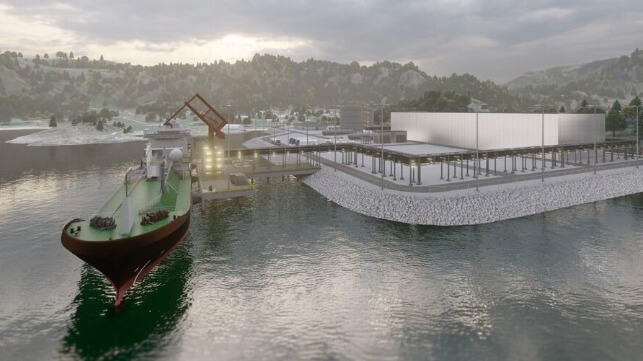Large CO2 Storage Projects Proceeding in Malaysia and Norway

Efforts are intensifying around the world to develop large-scale CO2 storage to permanently sequester carbon produced at large industrial sites or even from ships underway. In the latest developments, agreements were reached for projects in Norway and Malaysia, with each being highlighted among the largest offshore sites for this emerging industry.
Malaysia to Sequester CO2 from Gas Field
Malaysian energy company PETRONAS reported that it has reached the Final Investment Decision for the development of its Kasawari CO2 Sequestration (CCS) project offshore Sarawak, a Malaysian state on Borneo and a region rich in gas deposits. The CCS project, to be located about 125 miles off Bintulu, is expected to reduce carbon dioxide volume emitted via flaring in the offshore gas fields by 3.3 MtCO2e annually. According to PETRONAS, once operational, it will be one of the largest offshore CCS projects in the world.
The FID marks a crucial stage in the progress of CCS solutions. This project is expected to become the catalyst in achieving end-to-end CCS capability development within PETRONAS and the first step in unlocking Malaysia’s potential as a regional CCS solutions hub,” said Hasliza Othman, Chief Executive Officer of Carigali Sdn Bhd (PCSB), a wholly-owned subsidiary of PETRONAS.
PETRONAS reports that the Engineering, Procurement, Construction, Installation and Commissioning (EPCIC) contract for the project has been awarded to Malaysia Marine and Heavy Engineering. The firm earlier this year also secured the front-end engineering design (FEED) contract for the project. The EPCIC contract calls for the construction of a 14,000-metric ton (MT) topside, a 15,000-MT 8-legged jacket for the Kasawari CCS platform, and a bridge linking to the Kasawari central processing platform (CPP). Upon completion, the platform will be installed at a water depth of over 350 feet.
Norway’s Energi North Sea Project
The project is projected to come online by the end of 2025 as part of the development of the Kasawari gas field. The companies report it will have the ability to capture up to 3.3 million tons of CO2 annually while an additional total of about 71 to 76 million tons of CO2 from the Kasawari CCS project will be reinjected into the field via pipeline.
At the same time in Norway, Horisont Energi and E.ON expanded their collaboration with an agreement for the supply, transfer, and storage of CO2 as part of an effort to create a European carbon value chain. E.ON intends to provide more than one million tons of existing CO2 per year from its European customer sites by 2030, starting from 2027 with a gradual increase. Horisont Energi will provide services on CO22 marine transport and long-term storage.

that matters most
Get the latest maritime news delivered to your inbox daily.
According to the companies, the agreement is an important milestone in the cooperation to develop the commercial CO2 transport and storage business. Horisont Energi will apply by early January 2023 for the license to operate the CO2 storage Errai project in the North Sea.
Horisont Energi plans to store four to eight million tons of CO2 annually in the first development phase of the Errai project, potentially storing more in later phases. The project includes an onshore terminal for intermediate CO2 storage, with the intention to permanently store the CO2 in an offshore reservoir. With the current plans, the Errai project will develop the second CO2 terminal in Norway. It was initiated by Horisont Energi in 2021, and CO2 storage is expected to start in 2026.
